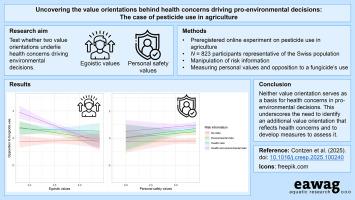Uncovering the value orientations behind health concerns driving pro-environmental decisions: The case of pesticide use in agriculture
IF 2.2
Current research in ecological and social psychology
Pub Date : 2025-01-01
DOI:10.1016/j.cresp.2025.100240
引用次数: 0
Abstract
Pro-environmental decisions, such as rejecting pesticide use in agriculture, may stem from both environmental and health concerns. Identifying which concerns are more decisive for pro-environmental decisions, and whether this varies between people, depending on their value orientations, could offer valuable insights into how to best promote pro-environmental decisions across different audiences. While biospheric values likely underlie environmental concerns, it is unclear which value orientation underlies health concerns. In a preregistered online experiment (N = 823), we explored whether egoistic or personal safety values—a subtype of personal security values developed for this study—underlie health concerns regarding pesticide use in agriculture. Participants reported on their opposition to the use of a fictitious fungicide in potato cultivation, based on information about its risks to human health (relevant for egoistic and personal safety values) and/or the environment (relevant for biospheric values). Stronger biospheric values were consistently associated with stronger opposition to the fungicide’s use, regardless of the risk information. Egoistic values interacted with risk information, but these interactions contradicted our assumption that egoistic values reflect health concerns. Personal safety values showed no interaction with risk information and were not independently associated to opposition to the fungicide’s use. Our findings suggest that neither egoistic nor personal safety values serve as the basis for health concerns driving pro-environmental decisions. This underscores the need to identify an additional value orientation that reflects health concerns and develop measures to assess it.

揭示推动亲环境决策的健康问题背后的价值取向:农业中农药使用的案例
支持环境的决定,例如拒绝在农业中使用农药,可能源于环境和健康方面的考虑。确定哪些问题对亲环境决策更具有决定性,以及这是否因人而异,取决于他们的价值取向,可以为如何在不同的受众中最好地促进亲环境决策提供有价值的见解。虽然生物圈价值可能是环境问题的基础,但尚不清楚哪种价值取向是健康问题的基础。在一项预先注册的在线实验(N = 823)中,我们探讨了利己主义或个人安全价值观(为本研究开发的个人安全价值观的一种亚型)是否构成了农业农药使用健康问题的基础。与会者报告说,他们反对在马铃薯种植中使用一种虚构的杀菌剂,理由是该杀菌剂对人类健康(与自私和个人安全价值有关)和/或环境(与生物圈价值有关)的风险信息。无论风险信息如何,生物圈值越高,对杀菌剂使用的反对就越强烈。利己主义价值观与风险信息相互作用,但这些相互作用与我们的假设相矛盾,即利己主义价值观反映了健康问题。个人安全价值与风险信息没有相互作用,并且与反对使用杀菌剂没有独立的联系。我们的研究结果表明,无论是利己主义价值观还是个人安全价值观,都不能作为推动亲环境决策的健康考虑的基础。这突出表明有必要确定反映健康问题的额外价值取向,并制定评估措施。
本文章由计算机程序翻译,如有差异,请以英文原文为准。
求助全文
约1分钟内获得全文
求助全文
来源期刊

Current research in ecological and social psychology
Social Psychology
CiteScore
1.70
自引率
0.00%
发文量
0
审稿时长
140 days
 求助内容:
求助内容: 应助结果提醒方式:
应助结果提醒方式:


